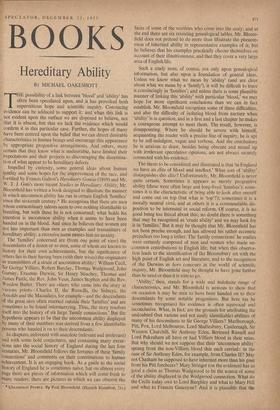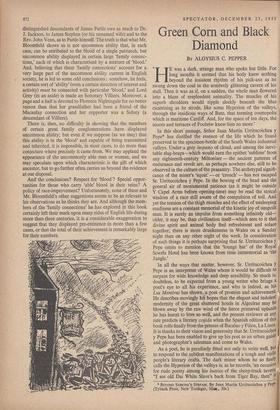BOOKS
Hereditary Ability
BY MICHAEL OAKESHOTT THE possibility of a link between 'blood' and 'ability' has often been speculated upon, and it has provoked both superstitious hope and scientific inquiry. Convincing evidence can be adduced to support it; and when this link is not evident upon the surface we are disposed to believe, not that it is absent, but that we lack the evidence which would confirm it in this particular case. Further, the hopes of many have been centred upon the belief that we can detect desirable characteristics in human beings and encourage this appearance by appropriate progenitive arrangements. And others, more certain that they know what is undesirable, have limited their expectations and their projects to discouraging the dissemina- tion of what appear to be hereditary defects.
Impelled by curiosity, some general ideas about human cmality and some hopes for the improvement of the race, and• fortified by Francis Galton's Hereditary Genius (1869) and Mr. W..1'. J. Gun's more recent Studies in Hereditary Ability, Mr. Bloomfield has written a book designed to illustrate the manner in which uncommon ability has run in certain English 'families' since the sixteenth century.* He recognises that there are men whose extraordinary talents seem to owe nothing identifiable to breeding, but with these he is not concerned; what holds his attention is uncommon ability when it seems to have been handed on in the blood. And since he believes that women are not less important than men as examples and transmitters of hereditary ability, a recessive name causes him no anxiety.
The 'families' concerned are (from one point of view) the descendants of a dozen or so men, some of whom are known to history for their own 'achievements, but the significance of others lies in their having been (with their wives) the originators or transmitters of a strain of uncommon ability : William Cecil, Sir George Villiers, Robert Barclay, Thomas Wedgwood, John Gamey, Erasmus Darwin, Sir Henry Strachey, Thomas and James Pattie, the Rev. John Venn, James Stephen and the Rev. Weedon Butler. There are others who came, into the story at various points—Charles 11, the Russells, the Sidneys, the A rnolds and the Macaulays, for example—and the descendants of the great sires often married outside their 'families' and arc sometimes to be found intermarrying. Thus, the story resolves itself into the history of six large 'family connections.' But the hypothesis appears to be that the uncommon ability displayed by many of their members was derived from a few identifiable Persons who handed it on to their descendants. ..
In chapters, enlivened with anecdote (relevant and irrelevant) and with some bold conjectures, and containing many excur- sions into the social history of England during the last four centuries, Mr. Bloomfield follows the fortunes of these 'family Connections' and comments on their contributions to human achievement. It is an engaging book. As a guide to the social history of England he is sometimes naive, but on' almost every page there are pieces of information which will come fresh to many readers; there are pictures in which we can observe the • UNCOMMON PEOPLE. By Paul Bloomfield. (Hamish Hamilton, 21s.) faces of some of the worthies who come into the story; and at the end there are six revealing genealogical tables. Mr. Bloom- field does not pretend to do more than illustrate the phenom- enon of inherited ability in representative examples of it; but he believes that his examples practically choose themselves on account of their illustriousness, and that they cover a very large area of English life.
Such a study rests, of course, not only upon genealogical information, but also upon a foundation of general ideas. Unless we know what we mean by 'ability' (and are clear about what we mean by a 'family), it will be, difficult to trace it convincingly in `families'; and unless there is some plausible manner of linking this 'ability' with particular 'blood,' we may hope for more significant conclusions than we can in fact establish. Mr. Bloomfield recognises some of these difficulties, and also the difficulty of isolating blood from nurture when `ability' is in question, and in a first and a last chapter he makes a courageous attempt to meet them. The result, however, is disappointing: Where he should be severe with himself, acquainting the reader with a precise line of inquiry, he is apt to be self-indulgent, vague and verbose. And the ,conclusions he is anxious to draw, besides being obscure and mixed up with irrelevant speculative opinions, are not always securely connected with his evidence.
The thesis to be considered and illustrated is that 'in England we have an elite of blood and intellect.' What sort of 'ability'. distinguishes this elite? Unfortunately, Mr. Bloomfield is never quite certain. Sometimes it appears as merely progenitive ability (these were often large and long-lived 'families'); some- times it is the characteristic of being able to look after oneself and conic out on top (but what is `top"?); sometimes it is a morally neutral virtu, and at others it is a commendable dis- position to be interested in social reform. Of course, it is no good being too finical about this; no doubt there is something that may be recognised as 'crude ability' and we may look for it in `families.' But it may be thought that Mr. Bloomfield has not been precise enough, and has allowed his rather eccentric prejudices too long a tether. The 'family connections' he studies were certainly composed of men and women who made un- \conunon contributions to English life; but when this observa- tion leads to the identification of the Bloomsbury set with the high point of English art and literature, and to the recognition of the Darwins as hors contours in the world of scientific inquiry, Mr. Bloomfield may be thought to have gone farther than lie need or than it is wise to go.
`Ability,' then, stands for a wide and indefinite range of characteristics, and Mr. Bloomfield is anxious to show that on occasion it may be seen to have been handed on to their descendants by some notable progenitors. But here (as he sometimes recognises) his evidence is often equivocal and inconclusive. What, in fact, are the grounds for attributing the undoubted (but various and not easily identifiable) abilities of many of his descendants to Sir George Villiers? Marlborough, Pitt, Fox, Lord Melbourne, Lord Shaftesbury, Castlereagh, Sir Winston Churchill, Sir Anthony Eden, Bertrand Russell and Lord Pakenham all have or had Villiers blood in their veins. But why should we not suppose that their 'uncommon ability' sprang from the non-Villiers blood that each carried : in the case of Sir Anthony Eden, for example, from Charles II? May not Chatham be supposed to have inherited more than his gout from his Pitt forebears? Mary Stringer (on the evidence) has as good a claim as Thomas Wedgwood to be the source of some of the ability displayed in the Wedgwood connection. What do the Cecils today owe to Lord Burghley and what to Mary Hill and what to Frances Gascoyne? And it is plausible that the distinguished descendants of James Pattie owe as much to Dr. J. Jackson, to James Stephen (or his unnamed wife) and to the Rev. John Venn, as to Pattle himself. The truth is that what Mr. Bloomfield shows us is not uncommon ability that, in each case, can be attributed to the blood of a single patriarch, but uncommon ability displayed in certain large `family connec- tions,' each of which is characterised by a mixture of `blood.' And, believing that these `family connections' account for a very large part of the uncommon ability current in English society, he is led to some odd conclusions : somehow, he feels, a certain sort of 'ability' (even a certain direction of interest and activity) must be connected with particular 'blood,' and Lord Grey (in an aside) is made an honorary Villiers. Moreover, a page and a half is devoted to Florence Nightingale for no better reason than that her grandfather had been a friend of the Macaulay connection and her supporter was a Sidney (a descendant of Villiers).
There is, then, no difficulty in showing that the members of certain great family conglomerations have displayed uncommon ability; but even if we suppose (as we may) that this ability is in the `blood' and capable of being transmitted and inherited, it is impossible, in most cases, to do more than conjecture where precisely it came from. We may applaud the appearance of the uncommonly able man or woman, and we may speculate upon which characteristic is the gift of which ancestor, but to go further often carries us beyond the evidence at our disposal.
And the conclusions? Respect for `blood'? Special oppor- tunities for those who carry `able' blood in their veins? A policy of race-improvement? Unfortunately, none of these and Mr. Bloomfield's other suggestions seems to be as relevant to his observations as he thinks they are. And although the mem- bers of the 'family connections' he has explored in this book certainly left their mark upon many sides of English life during more than three centuries, it is a considerable exaggeration to suggest that they displayed pre-eminence in more than a few cases, or that the total of their achievement is remarkably large for their numbers.



































 Previous page
Previous page